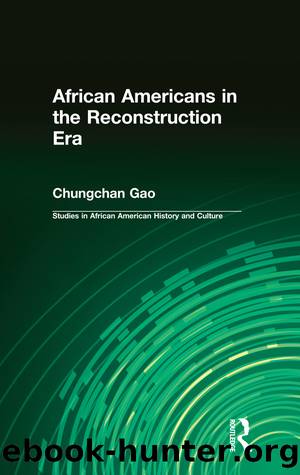African Americans in the Reconstruction Era by Chungchan Gao

Author:Chungchan Gao [Gao, Chungchan]
Language: eng
Format: epub
Tags: History, General
ISBN: 9781317775935
Google: 57ZACwAAQBAJ
Publisher: Routledge
Published: 2015-12-22T16:12:16+00:00
THE NEW CONTROL SYSTEM
To face the challenge created by the disintegration of absolute personal authority, Southern whites went through a readjustment period. Since the grassroots effort to reconstruct the old authority could barely provide them with a feeling of serenity, however, whites eagerly hoped to consolidate their gains by official policies, caring little whether it would irritate the North or not. The laissez-faire policy of the president gave them an opportunity, and they decided not to let it pass by.
The famous scholar Thomas B. Alexander, studying the Whig party, held that Southern Whigs had truly experienced an opportunity to restore their party and lead a moderate Reconstruction after the war.539 Because they had dragged the South into the war, Democrats were low-spirited and self-abased at that time. The Hinds County Gazette in Mississippi observed that âThey wore sack-cloth. They heaped several bushel of ashes on their heads. They took back seats, muffling in broken accents,âwe made a great mistake in secession.ââ540 In the meantime, the former Whigs, who had involuntarily followed in secession, now began to revive and intended to set about their political reorganization. When the president decided to build up the conservative party, the sign of its resuscitation became much clearer. Among the provisional governors chosen by the president were William H. Holden, the Democratic leader of the small farmers in the hill-country area of North Carolina, and Lewis Parsons, a former rich Whig from Alabama, both of whom had given great impetus to the restoration of peace during the war. In Texas and Florida, Johnson also named men who had never sworn any kind of allegiance to the Confederacy or who had been opposed to secession.541 This policy had encouraged both the small-farmers in hill counties and the former Whigs to participate in politics, and, consequently, there was a change in the political structure of the South.
The election results of the constitutional conventions in the summer of 1865 reflected this change. Few high Confederate officials or wealthy men had yet received individual amnesties, and the discredited mainstays of secession did not seek election. Understandably, over two-thirds of those elected had opposed secession in 1860.542 The former Whigs were especially conspicuous, many of whom had held office before the war. While the top level of antebellum secessionists were excluded, the professional constitution of the delegates did not show too many differences from their antecedents. Despite having no formal organization, Whigs to a large extent influenced the process of the constitutional conventions. To cooperate on the presidential strategy, they tried to form âa great party, irresistible in its power, and sufficiently efficacious and strong to control the next Presidential election, to defeat the Radicals, and to place some conservative Northern man in the presidential chair of the United States.â543 This party would conditionally approve the Thirteenth Amendment, involuntarily pronounce the secession ordinances null and void, and acquiesce in repudiation of all debts contracted by the Confederacy. Generally speaking, the constitutional conventions demonstrated the triumph of the moderates. At the
Download
This site does not store any files on its server. We only index and link to content provided by other sites. Please contact the content providers to delete copyright contents if any and email us, we'll remove relevant links or contents immediately.
| Africa | Americas |
| Arctic & Antarctica | Asia |
| Australia & Oceania | Europe |
| Middle East | Russia |
| United States | World |
| Ancient Civilizations | Military |
| Historical Study & Educational Resources |
Goodbye Paradise(3798)
Men at Arms by Terry Pratchett(2832)
Tobruk by Peter Fitzsimons(2507)
Borders by unknow(2301)
Arabs by Eugene Rogan(2292)
Pirate Alley by Terry McKnight(2217)
Belonging by Unknown(1854)
More Than Words (Sweet Lady Kisses) by Helen West(1853)
It's Our Turn to Eat by Michela Wrong(1723)
The Biafra Story by Frederick Forsyth(1653)
The Source by James A. Michener(1602)
Botswana--Culture Smart! by Michael Main(1597)
Coffee: From Bean to Barista by Robert W. Thurston(1538)
A Winter in Arabia by Freya Stark(1534)
Gandhi by Ramachandra Guha(1528)
The Falls by Unknown(1520)
Livingstone by Tim Jeal(1482)
The Shield and The Sword by Ernle Bradford(1402)
Africa: Altered States, Ordinary Miracles by Richard Dowden(1381)
